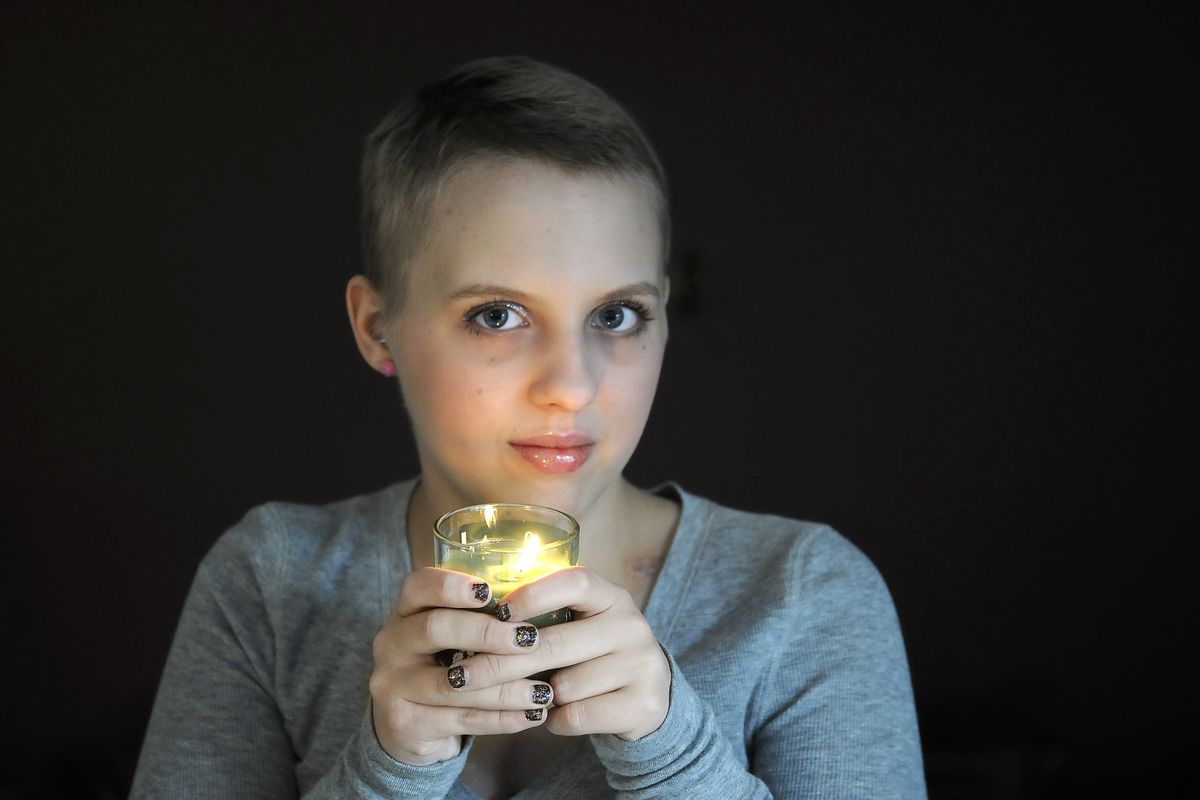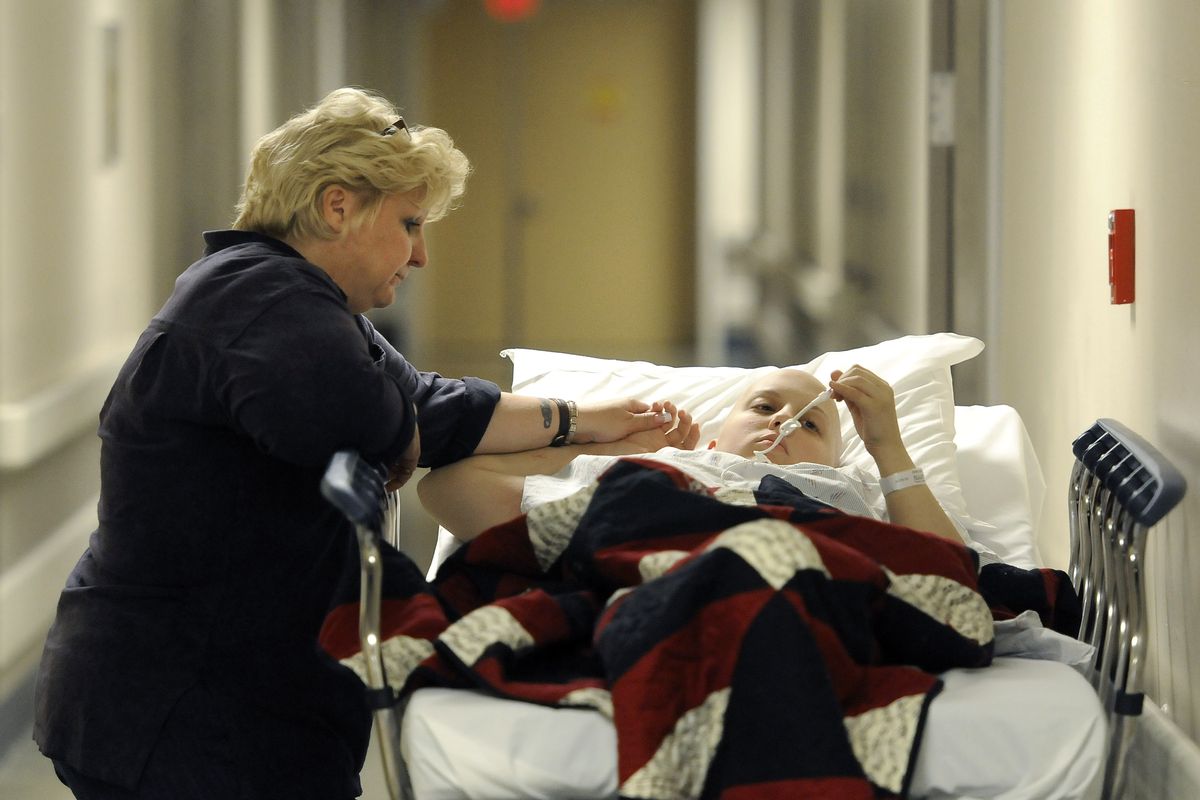‘Go, stop, rest’
Teenage cancer patient learning to cope with setbacks, struggles
Carissa Outen is recovering after a summer of cancer treatments in Seattle. The teen plans to start at Gonzaga University in fall 2011. (Dan Pelle)
A life’s chapter can be filled with heights a person will never forget and lows they’d rather never existed.
That was 2010 for Carissa Outen and her mother, Gwen Ashcraft, who rarely left her side.
“So many things, and so many stories and the ride of our lifetimes,” Ashcraft said.
A sparkling senior year: voted prom queen, graduated from North Central High School, accepted to Gonzaga University.
News that her rare cancer had returned: chemo and yet more chemo.
A few days after Outen received her diploma she was in Seattle to prepare for a stem-cell transplant, but nothing went as planned.
The next six months: More chemotherapy and radiation, bacterial infections, other medical complications, stem-cell replacement, dramatic weight loss, a return to Spokane, back to the local hospital, a new apartment, a car wreck, another operation …
In a word: “Hell,” Ashcraft said. “It was terrible. It was miserable.”
The young woman is on the mend, but she knows there could be challenges ahead.
“Today is good,” Outen, now 19, said. “I think we’ve learned to say – for now.”
Sleep-deprived in Seattle
As soon as mother and daughter arrived in Seattle, plans began to unravel.
The promised space at Ronald McDonald House was unavailable, so they stayed in a motel. After a short time, Outen became ill and doctors determined she had E. coli – the first of two bacterial infections. A whole series of other medical complications followed.
“There were times when we were back and forth to the hospital four times in a day,” Ashcraft said. One of Ashcraft’s e-mails in early August describes how rapidly the situation could change: “Not 10 minutes after the lumbar puncture, Carissa started shaking again and her fever was on the rise. Neurology was not equipped to handle that so it was a trip down to emergency room and then that bought her a ticket up to the oncology floor ICU. When this happens her fever goes up and her blood pressure goes down. Way down. The doctor was already in this morning … and they are going to take her out of ICU into a regular oncology room, but they are looking at taking out her central line. They feel that is where the bacteria is gathering.”
“So many things, minute-by-minute, were reactive,” Ashcraft said. “I didn’t know at any given time how to explain what was going on.”
During the three months the mother and daughter were in Seattle, many of Outen’s treatments were done as outpatient, which left Ashcraft as sole caregiver.
It was terrifying, she said.
Following the stem-cell transplant, for example, Outen needed 18 different medications.
“When to give them, when not to, and some could have been detrimental to the health of the new stem cells if I gave them past certain dates,” Ashcraft said.
The mother and daughter also found it challenging to be in a medical community with unfamiliar doctors.
“They were good doctors in the sense that they know how to treat cancer,” Ashcraft said. “But they don’t know how to treat the soul.”
Home sweet home
Outen’s been back in Spokane since late August. On Sept. 2 she posted to Facebook: “Been a busy, but an amazingly good week. It’s good to be home. I adore my life.”
She continues to face challenges, she’s had more chemo and operations, but she’s been taking life one step at a time.
She has returned to work at Albertsons as doctors allow, which is not on a consistent basis.
“Taking it slow, and being safe,” Outen said. “I have to think about being healthy.”
Many complications can follow a stem-cell transplant. Every time Outen tells her mother about a new pain, Ashcraft says she freezes.
“I’m still in reaction mode … I may have to kick into gear at any moment,” Ashcraft said. “I don’t know when that full breath will ever come.”
Outen and her mom have moved to an apartment on the South Hill. It’s smaller, cleaner and simpler, Ashcraft said.
Outen planned to take a trip to Scotland in June, but that may not happen since she wrecked her car. Now, “I need to save for a car,” she said.
She could have started at Gonzaga University this fall, but she deferred until fall 2011. That is still the plan, she said.
Outen is slowly returning to the person she was before her cancer returned, but it’s slow.
“Instead of go, go, go; it’s go, stop, rest,” she said. “But no doubt, once I’m up to my full stamina, I will be right back at it.”
Both women are happy to close the chapter on 2010.
As Ashcraft said: “2010 was not our year.”

